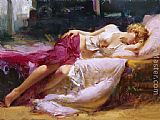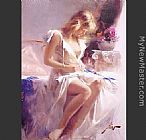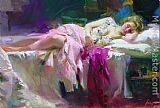"..Quiet Days in Clichy.."


A footloose American author drinks in the joys of the Bohemian life in this screen adaptation of the autobiographical novel by Henry Miller. Joey (Paul Valjean) is an aspiring writer from the United States who is living in Clichy, a small town near Paris, France, with his friend Carl (Wayne Rodda), a schoolteacher. Joey and Carl share a passionate enthusiasm for women, and in Chichy, a place where he can sense lust in the breeze, Joey can revel in his obsessions with both sex and the written ... More


Quiet Days in Clichy is an autobiographical novella written by Henry Miller. It is based
on some of his loony Parisian adventures in the early 1930s, when he and Alfred Perlès,
both struggling writers, shared a small apartment in suburban Clichy..


'http://www.crazyprofile.com/clocks/swf/dollz_clock01.swf ~ "..time goes by.."
The rambling plot follows the expatriate, perpetually broke and hungry Miller in and
around the Place Clichy. The book is split into two parts. In the first, Miller and his
equally destitute roommate Carl (Perlès) search for food and navigate relationships
with various women. This leads to a recollection of an evening he and Carl spent at
their home with a Danish woman Miller had been introduced to at a party, also named
Christine, and Corinne, who may or may not have been an acrobat. The four of them have
a spontaneous orgy, which upsets Christine, and is laughed off by the other three..




This tender and nostalgic work dates from the same period as Tropic of Cancer (1934).
It is a celebration of love, art, and the Bohemian life at a time when the world was
simpler and slower, and Miller an obscure, penniless young writer in Paris. In" Quiet
Days in Clichy" Miller describes a period that would shape his entire life and oeuvre.


(Quiet Days in Clichy)
 mrzotyi41.blogspot.hu ~ mrzotyi.blog.se
mrzotyi41.blogspot.hu ~ mrzotyi.blog.se“American literature today begins and ends with
the meaning of what Miller has done.”
Lawrence Durrell




QUIET DAYS IN CLICHY:
,,Not so quiet, Joey and Carl's days in Clichy... The two men, living in a small apartment, are penniless writers, with not enough to eat, which does not prevent them from enjoying life. One of their main interests is to get laid with women of various ages, physical appearances and nationalities. Among them, a neighbor in need, a fourteen-year-old half-witted girl, an American newspaper vendor who tends to smash up everything before making love, a Swedish woman who mourns her late husband..., all being merely sex toys they play with.. Written by Guy Bellinger
http://www.youtube.com/watch?v=_WVrUVJBprw
Look japanese sx dolls: http://www.youtube.com/watch?v=8Q9BAcjlB6M&feature=related //link
La dolce vita is Italian for "The Sweet Life.."
.gif)
Epicureanism: "..The Pleasure Principle.." : Epicurus (341–270 B.C.) is perhaps one of the most misinterpreted philosophers in the pantheon of great thinkers. His name and philosophy became synonymous with wanton hedonism. The Epicurean lifestyle is widely considered to be a celebration of sensuality, the indulgence in pleasure for pleasure's sake, a shameless enjoyment in all manner of debauchery and gluttony.
True Epicureanism:
Epicureanism actually means the opposite of its common usage today. While the original philosophy did mean a pursuit of pleasure, pleasure was defined as moderation, reading, and introspection, not the sensual indulgences that the word implies today.

Leisure Time:
Epicurus also was a big proponent of quiet time, pleasant conversation with a small circle of like-minded friends, and the joys of reading. The pleasures of sex were, for the most part, to be avoided, because its charms usually come at an exacting price. The rocky road of romance is fraught with many minefields, and the potential for profound angst and crushing heartbreak was not worth the effort, as far as Epicurus was concerned. Such anxiety would interfere with his quest for inner peace. It is safe to say that he rarely, if ever, invited a guest to swing with him on his ever-present hammock.
One of the worst things you can do, according to Epicurus, is fret about the uncertain future. If we can live in the now and achieve tranquility one day at a time, then we are in the best possible “space,” and the elusive yet eminently desirable ataraxia (inner peace) will be ours..


Live Unnoticed:
Epicurus was not a political animal. His definition of happiness dramatically differed from Aristotle's ethical and social activism. Epicurus saw the political life as adding to the agitathat would detract from his serene pursuit of modest pleasures. He was a stay-at-home kind of guy..
“Live unnoticed” was a main precept of Epicureanism. He and his followers were laid-back and low profile.
Epicurus lived and died quietly in a home with a garden outside of Athens, where he received guests and taught students. The Garden and its teachings and traditions lasted for almost 500 years.

The meaning of life is for us to discover that we are
true children of an infinitely loving and merciful Universe and
to find out what our responsibilities are to our global Creator,
and to fulfill those responsibilities..which means to find a right way of living.
true children of an infinitely loving and merciful Universe and
to find out what our responsibilities are to our global Creator,
and to fulfill those responsibilities..which means to find a right way of living.

"Cogito, Ergo Sum":
René Descartes* sought nothing less than the formidable task of a radically
revisionist look at knowledge. He started with the premise of doubt. He decided
to doubt everything. He believed that everything that he knew, or believed he
knew, came from his senses, and sensory experience is inherently suspect.
This is the classic Skeptic starting point. *French philosopher 1596–1650 )


Confucian Education:
Hongwu ordered the founding of schools throughout the empire, based the curriculum on Confucian teachings, and reinstated the examination system to recruit officials. His son the emperor Yongle (Yung-lo) followed up on this by ordering the foremost scholars to compile an official version of the Confucian classics and commentaries to guide students in their studies.

Yi Jing  – I Ching, "..the Book of Changes.."
– I Ching, "..the Book of Changes.."
The Book of Changes – I Ching in Chinese – is unquestionably one of the most important books in the world's literature. Its origin goes back to mythical antiquity.
Nearly all that is greatest and most significant in the three thousand years of Chinese cultural history has either taken its inspiration from this book.
..Small wonder then that both of the two branches of Chinese philosophy, Confucianism and Taoism, have their common roots here. -

Hesiod's Five Ages:
The Ages of Man are the stages of human existence on the Earth according to Greek mythology. Two classical authors (Hesiod and Ovid) in particular offer accounts of the successive ages of mankind, which tend to progress from an original, long-gone lucky age in which humans enjoyed a nearly divine existence to the current age of the writer, in which humans are beset by innumerable pains and evils. In the two accounts that survive from ancient Greece and Rome, this degradation of the human condition over time is indicated symbolically with metals of successively decreasing values..o



"..I had a dream of thousand delights;
of lips so sweet and eyes so bright.."
 "Art Spy" ~ aloha oe*
"Art Spy" ~ aloha oe* 
.gif)

